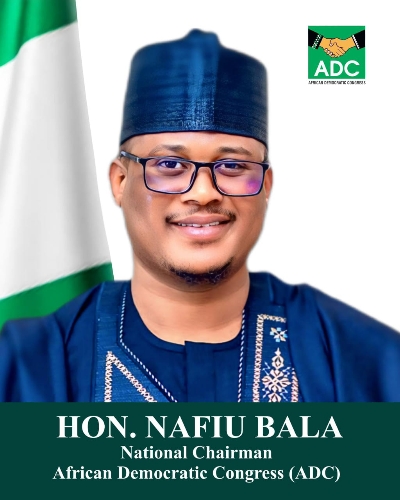In the complexities of Nigerian politics, the African Democratic Congress (ADC) has emerged as a significant player, representing the aspirations of a diverse electorate. Yet, recent events have cast a shadow over its leadership dynamics, particularly an attempt by David Mark and a cohort of old-school politicians to seize control of the party.
The ADC has long positioned itself as a progressive alternative in Nigeria’s political arena. However, the resignation of Ralph Nwosu, its former National Chairman, after the party joined an opposition coalition, opened the door to a contentious power struggle. The backdoor appointment of David Mark, a former Senate President, as Interim National Chairman was widely viewed as a ploy to consolidate elite influence. This move, however, was strongly resisted by Nafiu Bala, the Deputy National Chairman, who insisted on his constitutional right to assume leadership.
Bala’s claim rests firmly on the Electoral Act and the ADC constitution, which empower the deputy chairman to take charge in the absence of the substantive chairman. His decision to formally resume office not only underscores his commitment to party integrity but also highlights the broader struggle for legitimacy in an environment where opportunism and manipulation often prevail.
By invoking the law, Bala positions himself as a defender of democratic principles. His insistence that succession must follow established rules is a reminder that political legitimacy should rest on constitutional order rather than the whims of powerful individuals. In a landscape where influence often overrides institutions, this legal grounding reinforces the need for integrity in party leadership.
The involvement of seasoned figures such as David Mark, Atiku Abubakar, Nasir El-Rufai, Abubakar Malami, and Rauf Aregbesola raises critical questions about their motives. While their experience could strengthen the ADC, their attempts to impose an interim chairman suggest a desperate bid to remain politically relevant in a rapidly shifting landscape.
This maneuver reflects a wider pattern in Nigerian politics, where established politicians manipulate party structures to protect their interests. Such “hijacks” not only stifle grassroots leadership but also undermine the very democratic values parties are supposed to uphold. Worse still, their willingness to act on Nwosu’s misrepresentation shows how easily ambition can blind even experienced politicians, leaving parties fractured and electorates disillusioned.
The ADC now faces a defining moment. Bala’s assumption of leadership offers the party an opportunity to realign with its founding principles—transparency, accountability, and inclusiveness. To rebuild trust, the ADC must open its decision-making processes, strengthen internal governance, and engage meaningfully with grassroots members and civil society.
The attempted hijack of the ADC underscores the fragility of democratic institutions in Nigeria. It is also a reminder that legitimacy and continuity must flow from constitutional provisions, not opportunistic power grabs. If the ADC embraces this moment of crisis as a chance for renewal, it can re-emerge as a credible force in Nigerian politics.
In a nation yearning for transformative leadership, the ADC has the potential to stand out as a model of integrity and accountability. The road ahead may be challenging, but it is also an opportunity for the party to reaffirm its democratic credentials and inspire the confidence of a disenchanted electorate.


